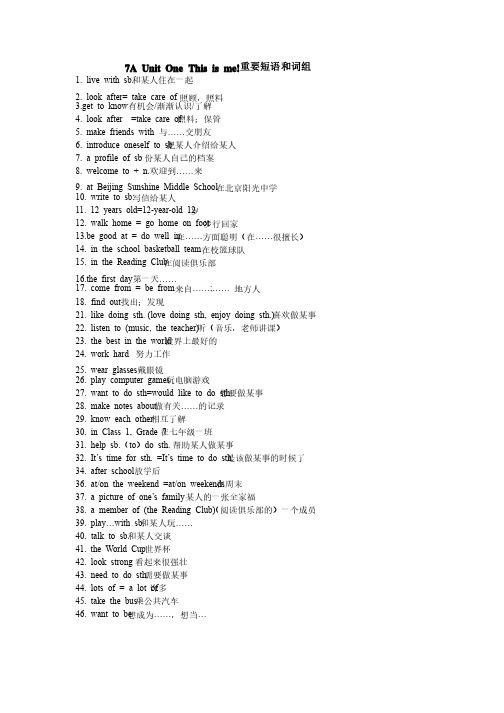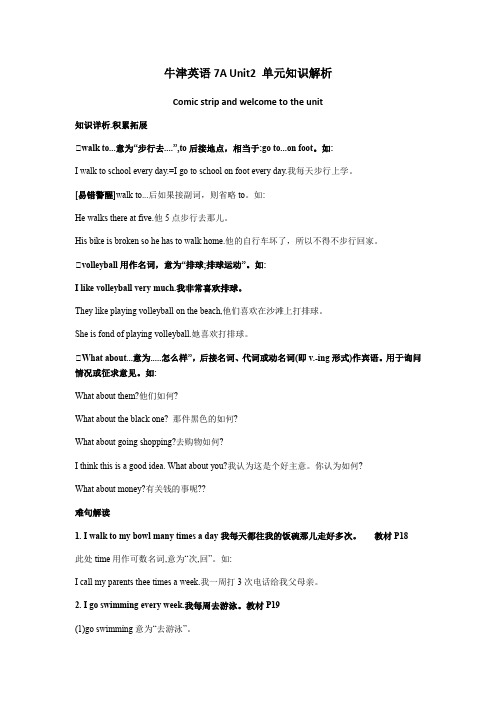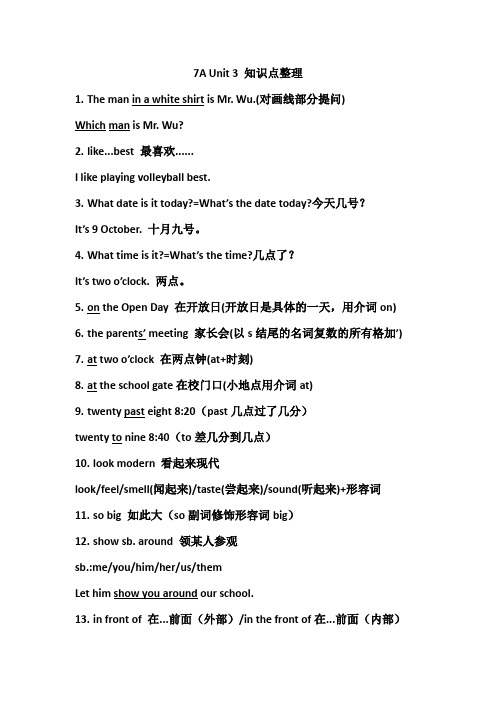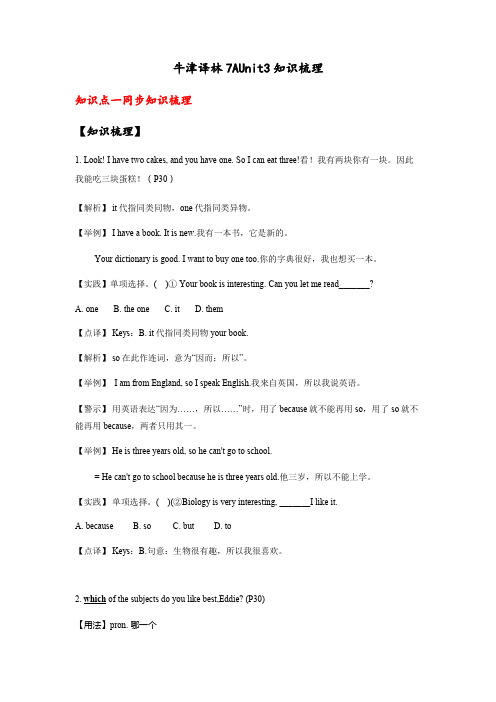译林牛津英语7A全册知识点汇总
译林版牛津初中英语7A一至四单元的重要词组、句型

7A Unit One This is me!重要短语和词组 1. live with sb. 和某人住在一起和某人住在一起2. look after= take care of 照顾,照料照顾,照料3.get to know 有机会有机会/渐渐认识/了解了解4. look after =take care of 照料;保管照料;保管5. make friends with 与……交朋友交朋友6. introduce oneself to sb 把某人介绍给某人把某人介绍给某人7. a profile of sb 一份某人自己的档案一份某人自己的档案8. welcome to + n. 欢迎到……来9. at Beijing Sunshine Middle School 在北京阳光中学在北京阳光中学 10. write to sb. 写信给某人写信给某人11. 12 years old=12-year-old 12岁12. walk home = go home on foot 步行回家步行回家13.be good at = do well in 在……方面聪明(在……很擅长)很擅长)14. in the school basketball team 在校篮球队在校篮球队15. in the Reading Club 在阅读俱乐部在阅读俱乐部16.the first day 第一天第一天……17. come from = be from 来自……;…… 地方人地方人18. find out 找出;发现找出;发现找出;发现 21. like doing sth. (love doing sth, enjoy doing sth.) 喜欢做某事喜欢做某事22. listen to (music, the teacher) 听(音乐,老师讲课)听(音乐,老师讲课)23. the best in the world 世界上最好的世界上最好的24. work hard 努力工作努力工作25. wear glasses 戴眼镜戴眼镜戴眼镜 26. play computer games 玩电脑游戏玩电脑游戏玩电脑游戏 27. want to do sth=would like to do sth. 想要做某事想要做某事28. make notes about 做有关……的记录的记录29. know each other 相互了解相互了解30. in Class 1, Grade 7 在七年级一班在七年级一班31. help sb. (to )do sth. 帮助某人做某事帮助某人做某事32. It’s time for sth. =It’s time to do sth. 是该做某事的时候了是该做某事的时候了34. after school 放学后放学后放学后 36. at/on the weekend =at/on weekends 在周末在周末37. a picture of one’s family 某人的一张全家福某人的一张全家福38. a member of (the Reading Club) (阅读俱乐部的)一个成员(阅读俱乐部的)一个成员39. play…with sb.和某人玩…… 40. talk to sb. 和某人交谈和某人交谈41. the World Cup 世界杯世界杯42. look strong 看起来很强壮看起来很强壮43. need to do sth. 需要做某事需要做某事44. lots of = a lot of 许多许多45. take the bus 乘公共汽车乘公共汽车46. want to be 想成为想成为……,想当…Unit 2 Let’s play sports 重要短语和词组1. Let’s play sports 让我们进行体育运动吧让我们进行体育运动吧2. Do you like any sports? 你喜欢运动吗?你喜欢运动吗?3. like walking 喜欢散步喜欢散步4. Really? 真的吗真的吗5. walk to my bowl 走到我的碗边走到我的碗边6. many times a day 一天许多次一天许多次7. play volleyball 打排球打排球8. play tennis 打网球打网球9. play football 踢足球踢足球 10. enjoy swimming 喜欢游泳喜欢游泳喜欢游泳 11. What’s your favorite sport? 你最喜欢的运动是什么?你最喜欢的运动是什么?12. like doing sth 喜欢作某事喜欢作某事13. after school 放学以后放学以后14. what about you ?=How about you? 你怎么样?你怎么样?15. go swimming 去游泳去游泳16. every week 每周每周17. love sports 爱运动爱运动18 .very much 非常非常19. my favorite football player/star 我特别喜爱的足球运动员/明星明星20. 22 years old 22岁21. a new member of 一名新成员一名新成员2.2 Huanghe Football Club 黄河足球俱乐部黄河足球俱乐部23. come from Guangdong 来自广东来自广东24. live in Beijing 住在北京住在北京25. look strong 看上去很壮看上去很壮26. play football very well 足球踢得好足球踢得好27. in his free time 在他空余时间在他空余时间28. study English 学英语学英语29. enjoy listening to music 喜欢听音乐喜欢听音乐30. make sb happy 使某人开心使某人开心 make sb feel great使某人感觉棒 31. want to do sth =would like to do sth 想做某事想做某事32. play in the next World Cup 踢进下次世界杯踢进下次世界杯33. hope his dream comes true 希望他梦想成真希望他梦想成真34. a lot of interesting books 许多有趣的书许多有趣的书35. get up 起床起床36. watch ball games/matches 看球赛看球赛37. after-school activities 课外活动课外活动课外活动 38. . my hero 我的偶像。
牛津译林版英语7A Unit2Let's play sports 单元知识解析

牛津英语7A Unit2 单元知识解析Comic strip and welcome to the unit知识详析.积累拓展➊walk to...意为“步行去....”,to后接地点,相当于:go to...on foot。
如:I walk to school every day.=I go to school on foot every day.我每天步行上学。
[易错警醒]walk to...后如果接副词,则省略to。
如:He walks there at five.他5点步行去那儿。
His bike is broken so he has to walk home.他的自行车坏了,所以不得不步行回家。
❷volleyball用作名词,意为“排球;排球运动”。
如:I like volleyball very much.我非常喜欢排球。
They like playing volleyball on the beach,他们喜欢在沙滩上打排球。
She is fond of playing volleyball.她喜欢打排球。
❸What about...意为.....怎么样”,后接名词、代词或动名词(即v.-ing形式)作宾语。
用于询问情况或征求意见。
如:What about them?他们如何?What about the black one? 那件黑色的如何?What about going shopping?去购物如何?I think this is a good idea. What about you?我认为这是个好主意。
你认为如何?What about money?有关钱的事呢??难句解读1. I walk to my bowl many times a day我每天都往我的饭碗那儿走好多次。
教材P18此处time用作可数名词,意为“次,回”。
如:I call my parents thee times a week.我一周打3次电话给我父母亲。
Unit3知识点整理牛津译林版七年级英语上册

7A Unit 3 知识点整理1.The man in a white shirt is Mr. Wu.(对画线部分提问)Which man is Mr. Wu?2.like...best 最喜欢......I like playing volleyball best.3.What date is it today?=What’s the date today?今天几号?It’s 9 October. 十月九号。
4.What time is it?=What’s the time?几点了?It’s two o’clock. 两点。
5.on the Open Day 在开放日(开放日是具体的一天,用介词on)6.the parents’ meeting 家长会(以s结尾的名词复数的所有格加’)7.at two o’clock 在两点钟(at+时刻)8.at the school gate在校门口(小地点用介词at)9.twenty past eight 8:20(past几点过了几分)twenty to nine 8:40(to差几分到几点)10.look modern 看起来现代look/feel/smell(闻起来)/taste(尝起来)/sound(听起来)+形容词11.so big 如此大(so副词修饰形容词big)12.show sb. around 领某人参观sb.:me/you/him/her/us/themLet him show you around our school.13.in front of 在...前面(外部)/in the front of在...前面(内部)Miss Li is standing in the front of our classroom and writing some new words on the blackboard.There is a tree in front of our house.14.on the ground/first/second/third floor在一楼/二楼/三楼/四楼The cinema is on the third floor.15.two classroom buildings两栋教学楼名词修饰名词时一般第一个名词用单数,但也有一些特例:clothes shops/sports shops/women teachers/men doctors16.have meetings/have a meeting 开会I want to know when to have the meeting.17.the man in a white shirt/the man in white穿着白衬衫的男的/穿着白衣服的男的in介词+颜色/衣服:穿着......(状态) The man in white is my brother.wear动词+衣服:穿着......(状态) I wear a red coat today.put on动词短语+衣服:穿上......(动作)It’s cold outside. Please put on your coat.18.the man with glasses 戴眼镜的那个男的(with介词:戴着)Who is the man with glasses?(句中有谓语,用介词with)Daniel wears glasses.(句中无谓语,用动词wear作谓语)19.look(v.) at=have a look(n.) at 看一看......Let me look at the picture.=Let me have a look at the picture.20.the pictures of my friends 我朋友们的照片21.on the wall 在墙上There is a picture on the wall.(墙上挂的或贴的东西用on)There is a hole in the wall.(墙内部的用in)22.Let me see. 让我想想。
Unit1知识点梳理2023-2024学年牛津译林版英语七年级上册

第一讲 7A Unit1 Language Point 梳理一.Unit 1 重点语法1.would like / love sth.想要某物例句:Would you like some water?肯定回答:Yes, please. Yes, I’d like / love to.否定回答:No, thanks.2.would like / love to do sth.想要做某事例句:Would you like to drink some water?肯定回答: Yes, I’d like / love to.否定回答:I’d like / love to, but …… .3.糖葫芦形容词结构:数词+ 名词(单数) + (形容词)例:80foothigh 80 英尺高fiveinchtall 5英寸高的7yearold 7岁的注意:①名词必须用单数②只能放在名词前作定语,不能放在be 动词后作表语。
4.read/look/see/watch几个“看”的用法和区别:look 强调看的动作①系动词。
译作看起来,后接形容词。
She looks happy.②不及物动词。
译作看,词组:look at…,用副词修饰。
Tom looked at me angrily.see 及物动词,译作看到,无进行时态,强调看的结果。
watch 及物动词,译作观看,注视。
强调观看正在进行中的,发生变化的活动过程,常用于看电视、看球赛、看演出等。
read 及物动词,译作阅读。
强调看文字内容的东西,常用于看书、看报纸、看杂志等。
5.疑问代词what、which、who 及疑问副词how、when 、where可以和动词不定式连用。
what to do 做什么which to do 做哪个who to do 如何做how to do 谁做when to do 什么时候做where to do 在哪里做6.“疑问词+ to do” 结构经常放在know,learn,see ,ask等动词后做宾语。
初中英语 牛津译林版7A Unit1-Unit8语法汇总

7A U1-U8语法汇总动词三单形式的变化规则用法:be动词,情态动词,助动词之后;行为动词之前提问:How oftenU5 特殊疑问句:特殊疑问词+一般疑问句?特殊疑问词:【what】”什么”➡是什么,叫什么,做什么可对主语,宾语,动作进行提问【when】“什么时候”询问时间,在询问具体时间,即“几点几分”,相当于“what time”【where】“在哪里”,用来询问地点,句中的不及物动词后不要加介词。
Where does Mr.Li live?【which】“哪一个,哪一些”,用来询问人或物,常构成“which +名词”结构或单独做句子的主语。
【who】“谁”,询问人【whose】“谁的”,既可用作形容词性物主代词,也可用作名词性物主代词。
Whose book is this?=Whose is this book?感叹句:What (a/an)+形容词+名词(+主语+谓语)!What a beautiful girl (she is)!How+形容词+the+主语+谓语!How beautiful the girl is!/基数词+量词+of+不可数名词”来表达a piece of bread一片面包 a glass of water一杯水a plate of chicken一盘鸡two bags of rice两袋米three cups of tea三杯茶◎复合名词变为复数时,一般只把主要名词变为复数:apple tree--apple trees与man,woman相关的复合名词变复数时,前后名词都要变成复数:woman teacher-women teachersU7 some&any there be句型◎there be句型:表达某地有某人或某物►肯定句T here be+名词(+地点状语)eg;There is some rice in the bowl.►否定句T here be+not +名词(+地点状语)eg;There aren’t any apples on the tree.►一般疑问句B e there+名词(+地点状语)?肯定回答:Yes,there be. 否定回答:No,there be not.eg:--Is there a big tree near the house. --Yes, there is./No, there isn’t.►特殊疑问句特殊疑问词+名词+be there (+地点状语)eg:How many boxes are there in the room?☑There is 可数名词单数/ 不可数名词☑There are 可数名词复数★【就近原则】There be 后面接多个名词时,be动词的形式取决于最靠近be动词的名词数【There be & have】There be 表示“某人或某物存在于某地”Have 表示“某人或某物拥有某东西”,强调所属关系※对there be句型的主语(名词)提问,要用‘what is+地点状语’,无论原句主语时单数还是复数,提问时be动词只能用is,回答时要根据具体情况而定。
牛津译林7AUnit3知识梳理

牛津译林7AUnit3知识梳理知识点一同步知识梳理【知识梳理】1. Look! I have two cakes, and you have one. So I can eat three!看!我有两块你有一块。
因此我能吃三块蛋糕!(P30)【解析】 it代指同类同物,one代指同类异物。
【举例】 I have a book. It is new.我有一本书,它是新的。
Your dictionary is good. I want to buy one too.你的字典很好,我也想买一本。
【实践】单项选择。
( )① Your book is interesting. Can you let me read_______?A. oneB. the oneC. itD. them【点译】 Keys:B. it代指同类同物your book.【解析】 so在此作连词,意为“因而;所以”。
【举例】 I am from England, so I speak English.我来自英国,所以我说英语。
【警示】用英语表达“因为……,所以……”时,用了because就不能再用so,用了so就不能再用because,两者只用其一。
【举例】 He is three years old, so he can't go to school.= He can't go to school because he is three years old.他三岁,所以不能上学。
【实践】单项选择。
( )(②Biology is very interesting, _______I like it.A. becauseB. soC. butD. to【点译】 Keys:B.句意:生物很有趣,所以我很喜欢。
2. which of the subjects do you like best,Eddie? (P30)【用法】pron. 哪一个【举例】It's hard to say which is better.很难说哪一个好些。
译牛7AUnit1重点难点讲解(译林牛津版七年级英语上册教案教学设计)
译牛7A Unit 1 重点难点讲解(译林牛津版七年级英语上册教案教学设计)1. He is very clever at Maths. 他擅长数学。
(P4)(1)clever是形容词,意为“聪明的,伶俐的”,同义词为bright,反义词为stupid。
(2)be clever at…意为“擅长于……”,相当于be good at。
例如:Jack is clever at English.=Jack is good at English. 杰克英语学得好。
be clever at与be good at后面跟动词时,必须用其-ing形式。
例如:Beibei is clever at / is good at dancing.贝贝擅长于跳舞。
Tom is clever at / is good at playing basketball. 汤姆篮球打得好。
2. He's in the school basketball team.他是学校篮球队的队员。
(P4)I'm in the Reading Club.我在阅读兴趣小组。
(P4)句中的“be in + 团队组织”意为“be a member of …”。
因此He's in the school basketball team.= He's a member of the school basketball team.I'm in the Reading Club. = He's a member of the Reading Club.例如:Mike is in the Country Football Team.迈克是国家足球队的队员。
Many students in our class are in the Swimming Club.我们班许多学生参加了游泳兴趣小组。
3. You can call me Simon. (P4)call意为“叫、称呼”,call sb. /sth. + 名称,意为“叫某人(某物)为……”。
牛津译林版七年级上册英语Unit1知识点汇总
牛津译林版七年级上册英语Unit1知识点汇总7A Unit 1 This is me!一.【精选短语】1. how to look after your e-dog如何照顾你的电子狗(1)疑问词+动词不定式(2)look after=take care of 照顾,照料2. Good evening.晚上好。
(晚上见面问候语)→比较:Good night.晚安。
(晚上分别时用语)3. love playing football after school喜爱放学后踢足球【知识链接】Love/like doing sth.喜欢做某事,强调习惯上的喜欢;Love/like to do sth.强调的是某一次的行为。
e.g. She loves watching TV, but today she loves to listen to music. Love的用法⑴vt.喜爱e.g. ①He loves his parents. (不能用like代替love)②She loves music.她爱好音乐。
⑵vt.热爱e.g. We love our motherland.我们热爱祖国。
⑶n.爱;挚爱a mother’s love for her children母亲对孩子的爱②fall in love with sb爱上…,e.g. He fell in love with her.③我们可在书信的结尾处看到例如Love Mary这样的署名,意思是With my love, Mary,一方面表示情感,一方面表示道别。
【用法拓展】lovely美丽的;可爱的e.g. lovely hair秀发,a lovely girl美丽的少女4. be good at sth/doing sth=do well in sth/doing sth擅长;在某方面表现好【知识链接】⑴He is good at telling funny jokes.⑵She always does well in English.5. wear glasses戴眼镜→ wear后接服装、装饰品等,表示“穿、戴”。
新牛津英语译林版7A各单元词汇及重点句型一览表
新牛津英语译林版7A各单元词汇及重点句型一览表Unit1 This is me.单词:1 oh /əʊ/ excl. 哦,啊2 e—dog /'i:dɒɡ/ n. 电子狗3 master /'mɑ:stə(r)/ n。
主人4 grade /ɡreɪd/ n. 年级5 student /ˈstju:dnt/n. 学生6 reading /’ri:dɪŋ/n。
阅读7 classmate /ˈklɑ:smeɪt/ n. 同班同学8 afterschool /ˈɑ:ftə sku:l/ 放学后9 slim /slɪm/ adj. 苗条的10 be good at /bi: ɡud æt/ 擅长于11 over there /’əʊvə(r) / /ðεə/ 在那边12 classroom /ˈklɑ:sru:m/ n。
教室13 dancing /'dɑ:nsɪŋ/n。
跳舞,舞蹈14 swimming /ˈswɪmɪŋ/n. 游泳15 age /eɪdʒ/ n。
年龄16 looks /lʊks/ n。
相貌,容貌17 cute /kju:t/ adj. 可爱的;讨人喜欢的18 hobby /'hɒbɪ/ n。
业余爱好19 glad /ɡlæd/ adj. 高兴地20 everyone /ˈevriwʌn/ pron.每人,人人21 comefrom /kʌm frɔm/ 来自22 glasses /’glɑ:sɪz/ n. 【复】眼镜句型:1.How to look after your e-dog.如何照顾你的电子狗。
2.I have short hair。
= My hair is short.我短发。
3.Let's meet my new classmates.让我们见见我的新同学。
4.She is tall and slim。
她高而苗条。
译林版牛津英语7A单词表
7A(unit 1)
中文
中文
哦,啊
电子狗
主人;大师
年级
学生
阅读
同班同学
放学后
苗条的
擅长于
穿过
教室
跳舞,舞蹈
游泳
年龄
相貌,容貌
可爱的;讨人喜欢的
业余爱好
高兴的
每人,人人
来自
[复]眼镜
词性/词组 excl. n. n. n. n. n. n. 词组 adj. 词组 adv. n. n. n. n. n. adj. n. adj. pron. 词组 n.
7A(unit 2) 散步,步行 的确,确实 碗,盆 次,回 网球 排球 享受…的乐趣;欣赏;喜 爱 去游泳 运动员 成员 俱乐部 空闲的 希望 梦想;梦 真的,真实的 变成现实,成为事实 画画 周末
n. adv.
n. n. n. n. vt. 词组 n. n. n. adj. vt. n. adj. 词组 n. n.
Unit 5 Unit 5 Unit 5 Unit 5 Unit 5 Unit 5 Unit 5 Unit 5 Unit 5 Unit 5 Unit 5 Unit 5 Unit 5 Unit 5 Unit 5 Unit 5 Unit 5 Unit 5 Unit 5
when inside knock knock on the door shout trick or treat if treat trick special question dumpling rice dumpling grandparent other thing lion lion dance firework find out more radion take photos at night show seen different around important
- 1、下载文档前请自行甄别文档内容的完整性,平台不提供额外的编辑、内容补充、找答案等附加服务。
- 2、"仅部分预览"的文档,不可在线预览部分如存在完整性等问题,可反馈申请退款(可完整预览的文档不适用该条件!)。
- 3、如文档侵犯您的权益,请联系客服反馈,我们会尽快为您处理(人工客服工作时间:9:00-18:30)。
Unit1 This is meLet ______________. 让他进来吧。
6、她长着长发。
She _____ _____ _____. = _______ ______ ______ long.7、提问外貌: What is he like? / What ______ he ______ _______?8、谈论国籍: Where _______ you from? / Where ______ you come from?I am from / come from China. = I am ____________.He is from _______ . = He ______ from ______. = He is ____________. (他是英国人) She ________________. = She __________________. (她来自美国。
)9、谈论出生地– be born-----Where ______ you born? I ____________ in Nanjing.10、谈论爱好:(1) like / love / enjoy doing sth(2) My hobby is playing football.She is good at swimming. = She does well in dancing. = She ______ ______.= She is a _____ _______.注意do well in 的否定句例如:他不擅长跳舞。
He ____________________________.11、everyone 每个人,大家=everybody (三单)我们班每个人都喜欢听音乐。
Everyone in our class __________________________.我们中的每一个人_____________________12、区别all (三者或三者以上都)/ both(两者都)(1) _______ of my parents work in a hospital.(2) My friends and I _______ want to go traveling.(一)????1.???2.???3.???4.(二)注意四、句型转换1.My pencils are in the pencil-box.(对划线部分提问2.I get up at six every day.(对划线部分提问) ______ ______ do you get up every day?3. Jim and Simon are good at swimming.(改为一般疑问句) ______ Jim and Simon _____ ______ swimming?3. He isn’t good at playing football. (同义句)(1) He ________________________ playing football. (2) He _____________ football _______.4. Millie has long hair. (改为否定句) Millie _______ ______ long hair.5. Daniel comes from London. (对划线部分提问)_______ _______ Daniel _______? / ______ _____ Daniel ______ _______?6. Jim likes drawing. (对划线部分提问) _______ ______ Jim ________ _______?Unit2 Let’s play sports!4、make: 1)制作make a kite2)使某人….锻炼使我们强壮。
_______________________________________.戴眼镜使他看起来聪明。
___________________________________________.5、want = would like 想要…你想去看足球赛吗?________________ watch the football match? Yes, _______________.6、hope: v.希望I hope _________________________(去北京).2) hope + 从句I hope ____________________________(我的梦想成真).注意:不能说hope sb to do sth7、else: adv. 另外,其他1) what / who / where else2) something / someone else_____________ do you __________________?(你还想买些什么?)8、interesting有趣的/ interested感兴趣的: adj.something interesting有趣的事情be interested in (doing) 对…感兴趣fun (n.) -----have( great / lots of) fun My grandfather often plays cards for________.(消遣) English is very _________. I’m very _____________ it.__________________________.(读书是件有趣的事。
)9、许多的表达法:many(可数) / much(不可数) / a lot of / lots ofI have ___________________ (许多作业要做)。
So I don’t have ________ time to play chess.三、语法:一般现在时(实义动词)1、注意动词的第三人称单数的变化形式have _______ do_______ fly________ study________ enjoy________ watch________ play________ go_________ dress________ be _______ need_______ get_________ say__________2如:3如:四、句型转换:1.2.3.4.5.Li Hua is in the Huanghe Football Club. (同义句)Li Hua is ______________________ the Huanghe Football Club.6.He looks strong. (对划线部分提问)________ ______ he _______? / ______ ______ he _______ ______?7.He studies English in his free time. (对划线部分提问)_______ _______ he _______ English?Unit3 Welcome to our school!1、so: 1)(连词)因此,所以(不能和_________同时出现)2)如此的so big / ____________ (如此多的人) / __________________(如此多的作业) 3)代替上文说的内容(代词)I think so. / I hope so. / I am afraid so.2、Which subject do you like best? = ________ is _______ ________subject?3、对点钟、星期几、日期的不同提问:1)The meeting begins at 2:30 p.m. ---- ______ _______ ________the meeting _______?2)It’s Monday today. ---- _______ ________ is it today?3)It’s was October 12th yesterday. ---- _________ ________ ______ ________ yesterday?4) The shop is open from 8:00 a.m. to 10:30 p.m. --- _________ _______ the shop ________? 4、区别in front of / in the front of5、区别不同的穿的表达:1)in 穿着(表状态)+衣服/ 颜色the boy in blue / a woman in a red dress区别于with the girl ______ long hair / glasses2)wear 穿、戴着(表状态)like to wear / wearing…3)put on穿上、戴上(强调动作过程)put it / them on -----___________(脱)Ex.1) Lucy likes _________ red. But today she __________ a purple blouse.2) Do you know the boy ______ the jeans?3) It’s very cold outside. Please ____________ your warm coat, or you will catch a cold.6、borrow sth from sb (借进)/ lend sth to sb(借出)7、Thanks for your help.= Thank you for _______ ______.8如:1) Who is knocking at the door? ____ may be Jim. 2) Kate buys a new computer. I also want to buy ____.4)Do you have a pen? Sorry, I don’t have ______. 3) There’s a book on the ground. Is _____ yours?Unit4 My Day重点词组Unit 5? Let’s celebrate!【单元学习重点和要求】一、语音1.不完全爆破pum(p)kin??? cho(co)late??? dum(p)ling??? ska(t)eboard??? mi(d)night2.句子重音和语调`Who `gives `you the ↘presents?Do you have any ↗stamps?Do you get any ↗present?My `parents, ↗aunts, ↗uncles, ↗cousin and ↘friends.`What do `you `do for ↘Halloween?二、词汇1.单词(略)2.词组???dr ess up as…????????????????????装扮成……???dressing room???????????????????? 化装室???care much about dress???????????? 讲究衣着???What are you cooking????Why do you like fishing????Where are you going????Which is your favorite festival????Thank you for telling me about the Mid-Autumn Festival.???It is wonderful!???Happy Halloween!四、语法: 表示时间的介词???at常用来表示在某点时间,即“在几点几分;在某一时刻”。
